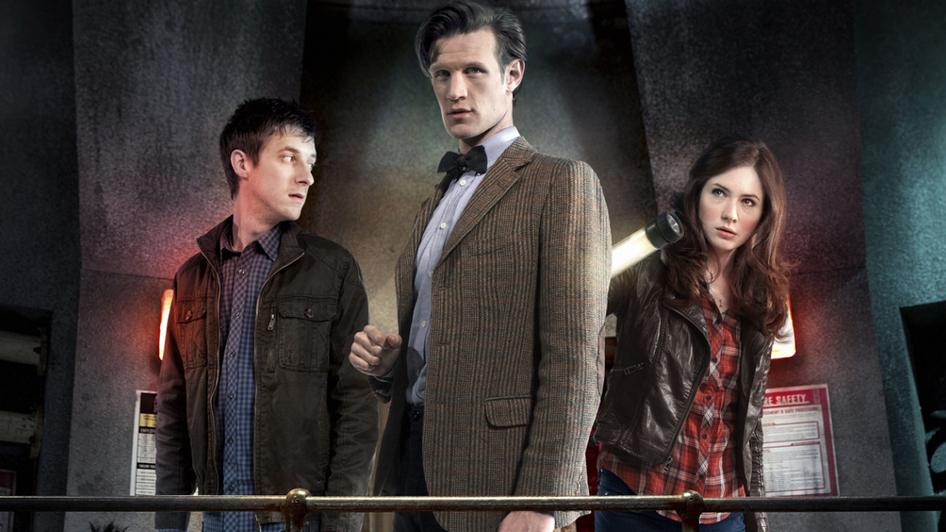Suppose that, in the near-future, there are industrial jobs that are too difficult for humans or robots to perform. They still need to be done, but there’s a high risk of death to a human or the loss of the investment of a robot. Either would make the work cost-prohibitive.
But it’s the future, and science has found a way. It’s called “the Flesh,” and it can be manipulated into creating a simulated human — a “Ganger,” short for “doppelganger,” a complete reproduction of a human being, down to scars and memories — that can be driven, in true mecha fashion, by an operator hooked up to a synaptic harness in a safe location. Without the operator, the Ganger degrades and decays back into its liquidic Flesh form.
And like all science-y things, something goes horribly wrong. In this case, a solar tsunami that, like the lightning strike in Frankenstein, severs the synaptic link, stabilizes the Flesh, and animates the Gangers.
That’s the premise for last night’s episode of Doctor Who, “The Rebel Flesh,” the first part of a two-part story by Life on Mars‘s Matthew Graham.
Some writers, like Philip K. Dick, would use this premise as a philosophical meditation on the nature of humanity. What makes us tick? What makes us human? Is it the fact that we were born? Is it the memories we have? Is it the capacity to love and to feel and to connect? The commercials for Blade Runner on BBC America during the episode seemed surprisingly apropos — and suggested a crossover in which the TARDIS lands in Los Angeles, 2019. A phildickian mindfuck of authentic humanity, simulated humanity, and identity would have been challenging ground for Doctor Who to cover.
Graham’s script gets there briefly.
One of the Gangers, based on the form of a young woman named Jennifer, struggles with the reality that she’s a created thing. And Rory accepts her as a person and he manages to convince most of the other humans to treat the Gangers as people, too.
But then one of the human models has a moment of total insanity, and this sets the stage for a classic base-under-siege story next week, as the humans have to survive the onslaught of their Ganger duplicates.
The trouble with looking at the first part of a 2-part Doctor Who story is that you’re only seeing half the story. And last night’s episode is definitely half of a story, because the last ten minutes don’t make a lick of sense.
Why did the base’s leader suddenly decide to gun down one of the Gangers, when they clearly weren’t hostile? Why does the Ganger-Jennifer suddenly decide to hunt down and murder her human “base”? What are the Gangers hoping to achieve? What does anyone want?
The only thing about the ending that did make sense was the cliffhanger resolution. If you didn’t see that one coming, you’ve clearly not watched much science-fiction television. 😉
I’ve compared this season of Doctor Who to Star Trek: Voyager once already, yet “The Rebel Flesh” makes me want to continue the comparison. The whole doubles idea makes me think of episodes like “In the Flesh” or “Course: Oblivion,” but what I’m especially reminded of is “To Walk The Night,” the Michael Jan Friedman/Gordon Purcell story from Star Trek Annual #4 from 1993, where a mining colony is beset by strange doings, only to discover that they’re not actually who they think they are — they’re actually duplicates created by the native lifeform.
But there’s another Star Trek comparison to make besides the familiar storytelling — the plot is scientifically stupid. Why would the solar tsunami affect this particular installation so badly? Since when was insanely corrosive acid pumped from beneath the surface like crude oil? (More to the point — why would humanity need insanely corrosive acid pumped from beneath the surface?) I realize these are questions that aren’t meant to be answered — the setting, no matter how absurd it is, exists solely to trap the characters together so they can do whatever it is they have to do.
I don’t have an opinion of “The Rebel Flesh,” honestly. I wasn’t captivated by it, but neither was I bored by it. I was, however, mildly annoyed at it. Besides some difficulty making out the dialogue due to impenetrable accents, the final act depends on a classic idiot plot structure in which characters who had hitherto been rational suddenly have to make stupid decisions. It was decent enough, but it was also unsatisfying on its own, and the concluding episode (next week in the UK, two weeks in North America) will make or break this story. We already know that it’s supposed to have a major cliffhanger, and I suspect I know what it is. (This blog post by novelist David McIntee makes a lot of sense to me.) My only hope is that the cliffhanger’s awesomeness isn’t simply to cover for deficiencies of storytelling.
I’m still waiting for this season of Doctor Who to “wow” me. Matt Smith’s brilliant, I love Arthur Darvill, and Karen Gillan is somehow more fetching (if such a thing is even possible), but the writing this year just hasn’t blown me away. Even Neil Gaiman’s story last week didn’t blow me away. I tell myself that Steven Moffat is playing a long game this year, and all the pieces won’t fall into place until October, but October is such a very, very long way away…
